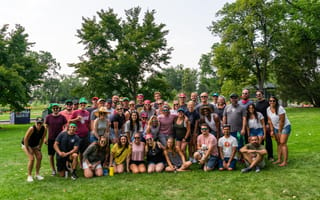Winning over a new buyer and staying relevant with existing clients is trickier than ever. According to a Salesforce study, 66 percent of customers expect companies to understand their needs and expectations, and 80 percent consider the experience a company provides to be just as important as its products or services.
As the general sentiment around sales pushes for greater transparency and personalization, closing new customers and retaining existing clients depends considerably on a nuanced approach.
“Understanding the needs, goals and expectations of our customers is imperative to developing the right strategy,” said Addy Earles, vice president of sales at AdCellerant. “A cookie-cutter approach in 2021 is not going to cut it, and won’t get you the sale.”
To learn more, we met with three local sales leaders who take a consultative approach to customer success. Each shared specific strategies to enhance client partnership and consultation soft skills and training suggestions to help lead the entire sales team to success.
At Travelers Haven, helping individuals secure temporary housing takes a balancing act of variables, each dependent on a customer’s individual situation. Interactive learning tools, client surveys and emotional intelligence help Duderstadt-Cape and her team meet clients’ changing needs.
What steps do you take to better understand the needs, goals and expectations of your customers?
What success looks like to the customer is always changing. For example, many of our customers have their own department goals. We collect their new quarterly goals at their monthly and quarterly reviews, which we build into daily success. I am also a huge fan of surveys; understanding our customers and the full experience we give them shines in a survey and is a quick way to show which successes will affect the largest audience.
Soft skills separate a good CSM from a great CSM.”
What training is in place to help CSMs in your organization become experts on your products and industry?
We have recently taken a giant step as an organization to improve training for our senior and new CSM members. We just rolled out Spekit, an interactive learning tool that really helps employees stand on their own two feet. This takes a 30-day employee to a 90-day employee, as it organizes and gives them new materials to review as they progress in onboarding.
For employees who are more senior with greater expertise in the ever-changing housing industry, we hold a monthly market analysis that shows how the industry as a whole is looking. We also have bi-weekly skill sessions for our selling and success team to strengthen current skills and to understand our product and market audience.
What soft skills have you found to be particularly important when it comes to consulting your clients? How have you strengthened those skills over time?
Empathy, communication, adaptability and overall emotional intelligence. Soft skills separate a good CSM from a great CSM. Being able to meet your client where they are and partnering with them along the journey is not easy, and is solely dependent on these soft skills. They allow for our team to connect on a deeper level with our clients and help to solve for their root need in all their housing matters.
Strengthening soft skills is challenging. We develop soft skills in every one-on-one and discuss how our approach to situations matters. As a team, we highlight skills in a bi-weekly training activity and share podcasts and books on emotional intelligence.
Every customer is unique, and a personalized touch is often necessary to earn a client’s trust and transparent feedback. For Earles, completing diligent client-needs analyses and tailored pre-call research help lead to success.
What steps do you take to better understand the needs, goals and expectations of your customers?
We are diligent about starting the sales process with a client-needs analysis. Understanding the needs, goals and expectations of our customers is imperative to developing the right strategy. A cookie-cutter approach in 2021 is not going to cut it, and won’t get you the sale. The most important step in this is doing your pre-call research. With all the technology at our fingertips, it’s important to come armed to the CNA with research on the company and industry as a whole. From there, our reps can tailor their questions based on the learnings they have assessed in the research phase. The most important thing a rep can take out of these meetings is to understand what the client’s measure of success will look like.
CSMs learn so much more from their clients by just listening and allowing space in conversations for their clients to open up.”
What training is in place to help CSMs in your organization become experts on your products and industry?
We hold industry and product trainings every week during our sales meeting. These can be on different topics and are led by different individuals based on their skills and knowledge. The benefits are twofold — first, the group is learning new information from a resident expert, and second, the presenter is honing in on their presentation skills. Our clients benefit from this as the information learned in these meetings might not be in their CSM’s current toolkit, but with this added exposure to a resident expert, they can now pass that knowledge on to the client.
What soft skills have you found to be particularly important when it comes to consulting your clients?
When consulting clients, the most important soft skills I have found over time have been listening, adaptability and problem-solving. CSMs learn so much more from their clients by just listening and allowing space in conversations for their clients to open up. I encourage them to not try to fill every gap in the conversation, even though that is natural for a lot of people. Give clients the time to open up and you’ll learn more about their needs and wants.
Adaptability is very important in sales, and especially in the past couple of years given the state of the world. Based on the client you are talking to, CSMs might have to change their approach and pivot their message. Being able to read the room and make these changes allows a CSM to sell to multiple different industries and people.
Problem-solving is critical for sales — you are there to solve a problem for your client. If you can’t figure that out, why would they buy from you? Coming up with solutions when things are difficult is a critical soft skill CSMs need to possess — even if the solution is the right one, having the ability to think through solutions is extremely important.
Preparation, questions and active listening — by actually giving the customer time and space to answer thoroughly — guide Coston-Nhep’s strategy for client consultations.
What steps do you take to better understand the needs, goals and expectations of your customers?
Questions, questions, questions. You can never ask too many questions. I also like to enter any customer conversation with a defined agenda so the customer feels like this is going to be a good use of their time and not just another vapid vendor call. I’ll do some industry research prior to see if there are any major milestone events that have occurred. Most importantly, I’ll look through my notes on our past conversations as well as their engagement with our support team.
I want to come into any customer conversation armed with facts, not assumptions. I find that asking sentiment questions (i.e. How are our tools performing for the team? Is there anything occurring today that would hold you back from renewing this relationship in the future?) is good at any point of the relationship.
Nothing is more powerful than dropping poignant questions and giving your customer the space to guide you through their goals.”
What training is in place to help CSMs in your organization become experts on your products and industry?
CircleCI does a great job at providing CSMs with both technical and commercial trainings. I’ve found the Challenger method training to be influential in how I approach customer conversations. It’s made me push for the deeper why when a customer brings up a feature need or the intent to downgrade service or to not renew service. I believe a CSM can do their best work if armed with a good baseline understanding of the product and a strong desire to understand their customer’s goals and pain points.
What soft skills have you found to be particularly important when it comes to consulting your clients?
Active listening, 100 percent. Nothing is more powerful than dropping poignant questions, zipping your lips up and giving your customer the space to guide you through their goals and desired outcomes. I feel that my experience in sales and CS has taught me that the best customer conversations happen when you ask smart, open-ended questions. The goal of any customer conversation is not to show off what you know about the product; the real goal is to learn something new about your customer that you didn’t know before, thus moving the client relationship in a positive direction.









